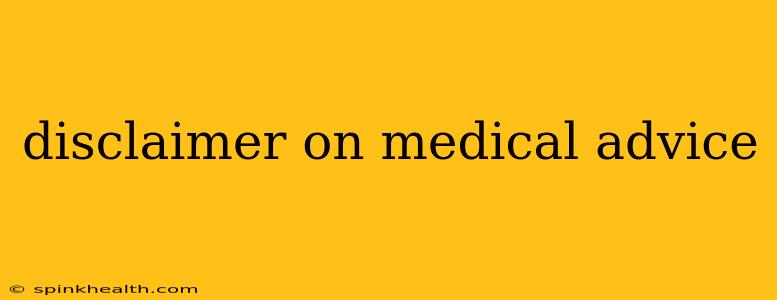Disclaimer on Medical Advice: Navigating the Complex World of Online Health Information
The internet has revolutionized access to information, making a wealth of knowledge readily available at our fingertips. This accessibility extends to the realm of health and wellness, where countless websites, blogs, and forums offer advice on a vast array of medical conditions and treatments. However, this ease of access also presents a significant challenge: the critical need for discerning between reliable information and potentially harmful misinformation. This disclaimer aims to clarify the limitations of online health information and emphasize the importance of seeking professional medical guidance.
What This Disclaimer Means:
This website/blog/article (choose the relevant descriptor) provides information for educational purposes only. The content presented here is not intended to be a substitute for professional medical advice, diagnosis, or treatment. We strive to provide accurate and up-to-date information based on reputable sources, but we cannot guarantee its completeness or accuracy. Any reliance you place on such information is therefore strictly at your own risk.
Why You Shouldn't Rely Solely on Online Health Information:
-
Individualized Needs: Medical conditions are complex and highly individualized. What works for one person may not work for another. Online information, while potentially helpful, cannot account for your unique medical history, current health status, or other factors that could influence your treatment plan.
-
Misinformation and Misinterpretation: The internet is rife with inaccurate, misleading, or outdated information. It's incredibly difficult to discern between credible sources and unreliable ones, leading to potential misinterpretations and potentially harmful self-treatment.
-
Lack of Physical Examination: A crucial component of medical care is a thorough physical examination. Online information cannot replace the hands-on assessment a doctor can provide, which is essential for proper diagnosis and treatment.
-
Potential for Harm: Self-treating based on online information can be dangerous, potentially delaying appropriate medical care and exacerbating existing conditions. Some self-treatments can even be harmful or interact negatively with other medications you might be taking.
What to Do Instead:
Always consult with a qualified healthcare professional before making any decisions related to your health or treatment. They can provide personalized advice based on your specific needs and circumstances. This includes:
- Scheduling an appointment with your doctor: This is the most crucial step. Discuss your concerns and questions with your physician.
- Seeking a second opinion: If you're unsure or have concerns, seeking a second opinion from another healthcare provider can provide added reassurance and clarity.
- Using reputable sources: When researching health information online, stick to reputable sources like the Mayo Clinic, the National Institutes of Health (NIH), and other established medical organizations. Be wary of information from unknown or unverified sources.
In Conclusion:
The information provided on this website/blog/article is for informational purposes only and should not be considered medical advice. Your health is paramount, and seeking professional medical guidance is essential for accurate diagnosis, appropriate treatment, and overall well-being. Always consult with a qualified healthcare professional before making any decisions related to your health.

